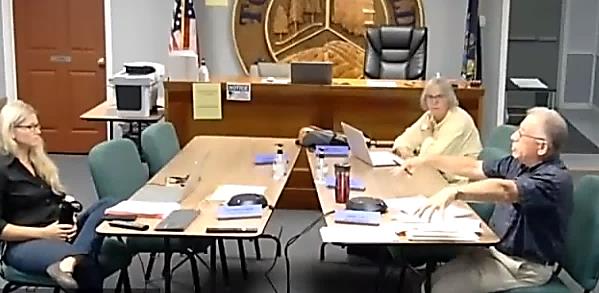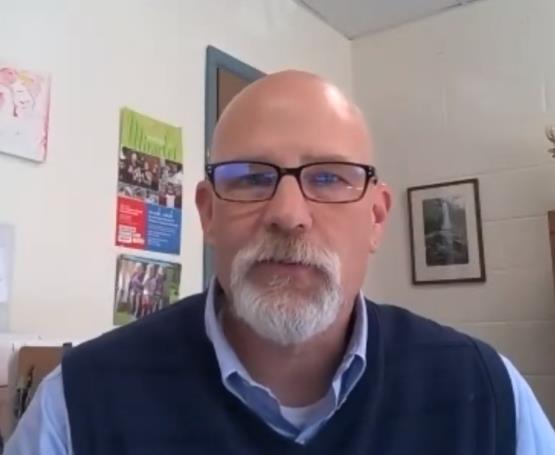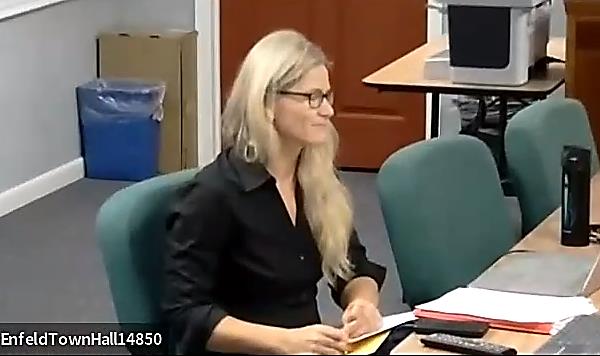Enfield Board splits; scraps proposed Sales Tax scoop
By Councilperson Robert Lynch; July 8, 2023
More than most, this story may need some explaining. Then, again, from a perch of principle, it may not.
“This is a question to me of tax fairness,” this writer, Councilperson, Robert Lynch, told the Enfield Town Board June 28th. “This is a question of balancing the scales and not making Enfield look like such a high-tax community; and this Board looking like it’s a tax and spend Board; and making the County look like it is so good to us, it is spending so little money.”

The issue is Sales Tax, and who gets to take the credit on our January tax bills for all the money that rolls into government from those eight pennies on the dollar each of us pays for just about everything we buy.
New York State gets half the money, for sure. But Tompkins County politicians have chosen to chop the remaining four per cent between themselves and local governments over the years. In simplest terms, we rural communities get 1.5 cents of the eight cents generated from sales outside the City of Ithaca. (The City has its own rules.) Tompkins County apportions the money to towns based on population.
We in Enfield benefit by nearly a million dollars a year ($949,000). But from the way it works now, it’s hard to see any of it.
Since January of 2011, by the choice of our Enfield Town Board, the Sales Tax revenue comes to us only as an offset to Tompkins County’s own property tax. Unlike many other towns, Enfield receives no check. And as a result, our Sales Tax share can’t be used to pay Enfield’s own budgeted expenses or assigned to keep the Town’s tax levy from kissing the stratosphere.
For each of two successive years, this Councilperson has given our Town Board the opportunity to change the rules, to reclaim the money for Enfield’s own use. And in each of those two years, the Town Board has declined to do so, most recently last month.
In 2022, the Board shunted the Resolution to its Finance Committee, which likely never met on the matter. Then, this June, the Resolution finally reached a vote. Councilperson Cassandra Hinkle joined me in seeking to reclaim the county-sequestered cash. Supervisor Stephanie Redmond and Councilperson Jude Lemke opposed it. (Councilperson James Ricks was excused that night.) The motion failed, falling one vote short of the needed majority.
“For Enfield’s purposes, it’s really not a benefit or a disadvantage doing so,” Jay Franklin, Tompkins County’s Director of Assessment, told the Town Board’s June 28th meeting. “It would affect your budget, but overall it really wouldn’t….”
“So whether you use it (the Sales Tax revenue) on your budget or use it in the County budget, the Enfield residents aren’t really receiving a penny less in Sales Tax revenue then what they would in either scenario,” Franklin informed the Town Board. “This is really a net-tax zero,”

Nonetheless, there would be impacts for individual taxpayers. Yet they’d be at the margins and generally miniscule. Invited to attend the Board’s meeting that night and having prepared an analysis beforehand, Franklin projected that 119 Enfield parcels would see taxes decrease should the Town reclaim its Sales Tax revenue; 1553 parcels would see taxes increase. But the average increase, Franklin said, would be just under four-tenths of one per cent, or $4.48.
“I think that to balance the scales, that’s a price I’m willing to pay,” this Councilperson, Lynch, told the meeting.
But Redmond and Lemke disagreed. And the reason they gave derives from the cruel irony that the higher Enfield’s town tax levy is relative to that of Tompkins County’s own levy, the greater share Enfield receives from the Payment in Lieu of Tax (PILOT) agreements struck between Tompkins County and Enfield’s solar farms.
According to Jay Franklin’s calculations, Enfield’s reclaiming its Sales Tax revenue would cut the Town’s PILOT reimbursements by more than half, from 28.2 per cent to 12.9 per cent of PILOT payments. Those payments are apportioned annually among the Town, Tompkins County, and local school districts.
“We’re better off staying the way we are because if we change, we’re going to lose part of the PILOT,” Councilperson Lemke reasoned. Redmond agreed.
Specific dollar losses from PILOT reimbursements were never stated in the meeting. But Enfield’s largest solar farm, Norbut Solar’s now-under-construction 15 Megawatt array off Applegate Road, has negotiated a 30-year PILOT agreement whose beginning annual payment totals $45,000. Reducing Enfield’s PILOT share from 28.2 to 12.9 per cent would cut Norbut’s payments to the Town from $12,690 to $5,805, or by just under $6,900. It’s less than the cost of two Councilpersons’ nominal salaries.
Several other solar farms hold PILOT agreements in Enfield, but their payments are less.
Nevertheless, the green-eyeshade math that to some may justify keeping Sales Tax reimbursements as they are can escape the gaze of any Enfield taxpayer who glances at a January bill. This year, Enfield’s tax rate was $7.26 per thousand, its tax levy up 14.5%. Tompkins County’s rate in Enfield was only $1.695 per thousand, its levy unchanged.
“Tompkins County has an eight-figure fund balance,” this Councilperson, Lynch, reminded his Town Board. “And at budget time, they always use it to keep the tax increase at zero.”
To that point, this Councilperson remarked: “Dan Klein, County legislator, always comes out, last day of the Expanded Budget Committee meetings and says, ‘I’m going to take the money out of Fund Balance,’ $442,000, takes it out like petty cash, and says ‘We’re going to have a zero tax rate—a zero tax increase…’ And it makes ‘em look so good. We in Enfield can’t do that. We don’t have an eight-figure fund balance and never will.”
“I look at this (the Sales Tax) and say it’s money that’s ours to have.”
Should Enfield begin taking its Sales Tax revenue as a check, Assessment Director Franklin calculates Tompkins County’s tax rate would rise here from $1.695 to $5.664 per thousand, but Enfield’s Town rate would tumble from $7.262 to $3.326.
So it would balance the burden: Five dollars (and change) for the County; three dollars for the Town.
“So I understand that the optics are frustrating,” Supervisor Redmond acknowledged, “and I understand (the problem in) explaining to residents why the optics are the way that they are.” But, she said, “It really comes through as a lot of semantics, more than anything. We would end up still losing money because of the PILOT.”
Supervisor Redmond would have the Town Board and its members provide constituents better explanation as to why taxes are as they are; why it benefits Enfield to keep its tax rate so high, and its county’s rate so low.

“But there is this disconnect,” I warned my Board colleagues that night. “And I’ll tell you, people look at this, constituents look at this, and say, ‘The County’s giving us a big break, and look at Enfield; we’re one of the highest taxed municipalities there is.’ And that’s not good to sell Enfield to people who want to move here, because it looks like we’re a high-tax town with that high a tax rate.”
Redmond and Lemke cautioned that this year’s 14 per cent Enfield levy increase exaggerated reality in that it partially reflected the correction of a prior year’s error in segregating the Town Tax from the Fire Tax.
“Our taxes still went up like eight percent,” I remarked, the correction I’d duly noted.
“Well, that was because we chose to have it go up because we had the new salt barn,” Redmond rebutted. “That was not reflective of anything other than our choice to expend more because we wanted to pay our Highway fairly, and we also had a new mortgage for what we bought.”
The Town Board last year approved 12 per cent raises for both the Highway Department workforce and the elected Highway Superintendent. The 2023 Budget also newly-assigned $47,500 to Salt Barn financing.
“I think it’s a question of tax equity and tax fairness,” this Councilperson reiterated. “It’s our money, and we should get it, and we shouldn’t let the County claw it back.” (Franklin shook his head.)
“They’re not. They’re using it (to cut the tax rate), Lemke said.
“It’s invisible to us, and it’s invisible to our constituents,” I replied.
“Well, if they didn’t do that, we’d be in a big problem,” the Supervisor answered.
How Enfield got to its current Sales Tax posture stands as its own comedy of errors. State law permits towns to tax state-owned forestland, but prohibits counties from doing so. Franklin said that’s why towns with significant state forests, including Danby, Dryden, Caroline and Newfield, benefit from treating Sales Tax just like Enfield does. They keep town tax rates high so as to squeeze New York State as much as they can.
But Enfield, the Director said, 13 years ago erroneously equated forestland with parkland. The Town Board thought it could tax Robert Treman Park, which it cannot. The Town Board never corrected its mistake, its error leading us to where we are today. Only now, there’s a new rationale.
“I just invite you to meet as many people as I have met this spring,” this Councilperson told the Town Board after its vote, “ and get beaten up by a lot of people who say, ‘Why are my taxes so high? Why does Enfield have such a high rate?’”
”Oh, I hear you,” Redmond acknowledged. “And it’s our job to educate them.”
Educate, perhaps. Or maybe change the rules.
###

